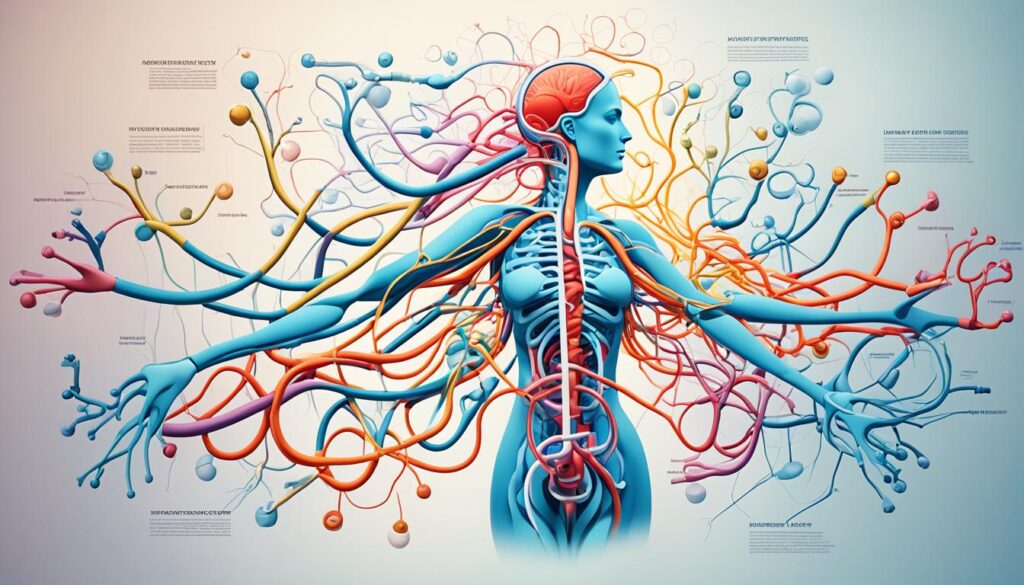#pee during sex problem
Have you ever felt like you’re the only one dealing with the issue of peeing during sex? It’s a topic often kept quiet, but it affects many more people than you might think. Urinary incontinence during sex can make intimacy harder and lower relationship happiness. It leaves many feeling embarrassed and alone.
This article aims to shed light on why people leak during sex, its effects, and how to fix it. If you’ve faced this problem, know you’re not alone. There are ways to regain your confidence and closeness with your partner.
Key Takeaways
- The pee during sex problem is more common than you think.
- Understanding the causes can lead to effective solutions.
- Open communication with partners is crucial for managing this issue.
- Exercises and therapies can significantly improve bladder control.
- Making lifestyle changes can help prevent urinary leakage.
Understanding the Pee During Sex Problem
The pee during sex problem means you can’t control your bladder during sex. It can be a light dribble or a big leak. Many people face this issue, more than we think.
What Does It Mean?
When you have a pee during sex problem, you can’t control your bladder during intimate moments. This can come from physical issues, mental health, or after having a baby.
How Common Is It?
Many women, especially after having a baby or going through menopause, experience urinary leakage during sex. A lot of people deal with this issue. Knowing how common it is helps us talk about it and find solutions.
Causes of Urinary Leakage During Sex
Urinary leakage during sex can be complex. Many factors like anatomy, health issues, and mental factors play a big role. These elements make it hard to control urine flow.
Anatomical Factors
How our body is built affects bladder control. The strength of pelvic muscles, bladder size, and urinary tract health matter a lot. Weak pelvic muscles can’t support the bladder well, making leaks more likely.
Medical Conditions That Contribute
Some health issues make incontinence worse during sex. Urinary tract infections make you need to go urgently. Prostate problems and pelvic organ prolapse can also hurt bladder function. These issues raise the risk of leaking during sex.
Psychological Influences
Mental factors are also key in urinary leakage during sex. Stress and anxiety make the body tense, which can affect bladder control. This mix of physical and mental issues can lead to incontinence during intimate moments.

Urinary Incontinence During Intercourse: Signs to Watch
Knowing the signs of urinary incontinence during sex is key. It helps in understanding and managing the issue. Both physical and mental signs can show that someone is dealing with the pee during sex problem. These signs affect how someone feels and their emotional health.
Physical Symptoms You Might Experience
There are physical symptoms of pee during sex that can be upsetting. These include:
- Unexpected leakage of urine while engaging in sexual activity
- Sensing an urgent need to urinate during intimate moments
- Discomfort or pain when pressure is applied to the bladder
- Leaking urine during certain physical positions or movements
Potential Psychological Effects
The mental effects of incontinence can be big. It can make someone anxious about being intimate because they worry about accidents. People might feel:
- Feelings of embarrassment or shame regarding urinary leakage
- Avoidance of sexual activity due to fear of leakage
- Increased stress during intimate encounters

Understanding these signs of urinary incontinence is the first step towards addressing the issue. It helps in better communication and finding solutions. This can improve intimacy and overall quality of life.
Solutions for Peeing During Sex
Finding ways to manage peeing during sex can boost confidence and make intimate moments more enjoyable. There are many strategies and treatments available. These range from simple exercises to medical procedures.
Exercises for Improved Bladder Control
Exercises that help control the bladder are key in stopping leaks. Kegel exercises are a top choice for strengthening the pelvic floor muscles. Here’s how to do Kegel exercises:
- Identify the right muscles: Contract the muscles you would use to stop urination.
- Practice the hold: Tighten the muscles for a count of three, then relax for three seconds.
- Repeat the process: Aim for ten repetitions, three times daily.
Doing these exercises regularly can improve bladder control and cut down on leaks. Adding physical therapy focused on incontinence can also help a lot.
Therapies and Medical Interventions
If exercises alone don’t work, there are medical options to consider. Here are some:
| Intervention Type | Description |
|---|---|
| Medications | Prescription drugs can help reduce urgency and frequency of urination. |
| Biofeedback | This technique uses sensors to help patients learn how to control their pelvic muscles. |
| Surgical Options | Procedures may be available to correct anatomical issues contributing to leakage. |
Talking to a healthcare provider can help find the right medical treatments. Trying these options can help you feel more confident and ensure a better sexual experience.
Managing Incontinence During Intercourse
Talking openly about incontinence with your partner is key. It helps build understanding and support. This kind of talk can make you both feel less anxious and more supportive of each other.
Communication With Your Partner
Talking about incontinence can make your relationship stronger. Here are some ways to do it:
- Share your feelings openly to create a sense of collaboration.
- Discuss specific worries or potential triggers that may arise during intimacy.
- Reassure each other that incontinence is a common issue many couples face.
- Encourage regular discussions to adjust to each other’s comfort levels.
Practical Tips for a Comfortable Experience
Here are some tips to make intimacy better while dealing with incontinence:
- Choose the right timing: Pick moments when both of you feel relaxed and stress-free.
- Select comfortable positions: Try different positions that are most comfortable and don’t put too much pressure on the bladder.
- Use protective barriers: Using disposable underpads or protective garments can give you extra security and peace of mind.
- Engage in foreplay: Spending time on foreplay can help ease anxiety, making the experience more enjoyable.
Using these tips can make intimacy more comfortable and safe. Understanding and empathy are crucial in overcoming any challenges related to incontinence. Putting connection first helps with both emotional and physical intimacy, keeping your relationship strong.
Preventing Urine Leakage During Intimacy
Many people want to make their intimate moments better without worrying about urine leakage. Making changes in your life can help prevent this issue. It’s important to focus on bladder health and use products that offer support.
Lifestyle Changes That Can Help
Changing your daily habits can improve your bladder’s health. Here are some tips for better bladder health:
- Maintain a healthy diet: Eat more fruits, veggies, and whole grains.
- Stay hydrated: Drinking enough water is good for your urinary tract.
- Limit caffeine and alcohol: These can make your bladder irritated.
- Manage your weight: Being at a healthy weight helps reduce pressure on your bladder.
Products Designed for Support
There are products that can give you extra confidence during intimate moments. Here are some options for urinary support:
- Panty liners: These are discreet and absorbent, great for light leakage.
- Absorbent pads: Good for slightly heavier leakage, they offer extra comfort.
- Specialized underwear: Brands like *Depend* and *Always Discreet* have options for active lives.
Conclusion
Many people struggle with the pee during sex problem, but it’s not insurmountable. This article has covered the causes and solutions. It’s key to understand urinary incontinence to improve communication and support.
Managing urinary incontinence means trying exercises, therapies, and making lifestyle changes. Adding recommended techniques and products to your life can help. This makes intimacy better.
Facing the pee during sex problem is a step towards a better sexual life. Use the available solutions, talk openly with your partner, and be proactive. You can have a fulfilling intimate life without worry.
FAQ
What causes urinary incontinence during intercourse?
Urinary incontinence during sex can come from many things. This includes things like anatomy, health issues like UTIs or pelvic organ prolapse, and feelings of anxiety or stress during sex.
How common is the pee during sex problem?
Many people deal with this issue. Studies show that a lot of individuals, especially women after childbirth or during menopause, experience urinary leakage during sex more than people think.
What are some signs of urinary leakage during sex?
Signs include sudden urine leakage, a strong urge to go to the bathroom during sex, or feeling discomfort in the bladder area. Feeling anxious about sex can also be a sign.
What exercises can help improve bladder control during sexual activity?
Pelvic floor exercises, like Kegel exercises, are great for strengthening muscles around the bladder. This can help improve bladder control during sex.
Are there any practical tips for managing incontinence during intercourse?
Talking openly with your partner about incontinence is key. Choosing comfy positions, timing sex well, and using barriers can also make things more comfortable.
What lifestyle changes can help prevent urine leakage during intimacy?
Staying on a healthy diet, drinking plenty of water, cutting down on caffeine and alcohol, and managing your weight can all help your bladder health. This can reduce the chance of leakage during sex.
What products are available for urinary support during sexual activity?
There are many products to help with urinary leakage. These include absorbent pads, panty liners, and special underwear that can make you feel more comfortable and confident during sex.
